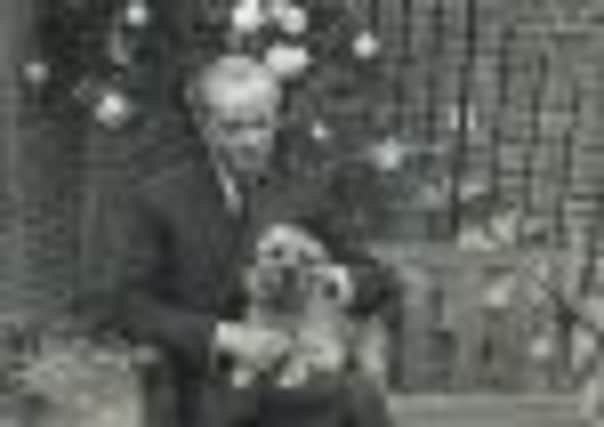Obituary: Lt-Col Freddy Burnaby-Atkins, solder and royal private secretary


Within five days of Freddy Burnaby-Atkins’s arrival in north France in 1940 the Germans launched a savage attack on the Maginot Line where he had been posted. Burnaby- Atkins, a young officer with the Black Watch, had been seconded to the 1st Battalion the Highland Division when he and the battalion were subjected to four weeks of constant bombardment on land and from the air. The German advance was unremitting and each night he and his colleagues had to retreat further towards the coast.
The Highland Division showed immense courage and staved off the German advance; their bravery in fighting off the German blitzkrieg around the town of Abbeville was particularly memorable.
Advertisement
Hide AdAdvertisement
Hide AdIn so doing, future historians have suggested, they delayed the German arrival at the coast and thus made the withdrawal from Dunkirk possible.
For Burnaby-Atkins there was no evacuation and he was captured by the Germans and had to suffer a long march as a prisoner of war – surviving on minimum rations – to a camp in Bavaria. He was held there until March 1941, when he was moved to another camp at Posen in Poland. There he spent much of his time, along with fellow inmates, planning to escape.
Their plan was simple and straightforward. Within one of the huts the men could lift the floorboards and proceeded to set up relays to dig a tunnel beyond the perimeter wire. The soil from the digging was concealed in their trousers and dribbled out during walks around the camp.
In September 1941, along with two other officers, Burnaby-Atkins escaped and with the help of forged papers, maps and a compass walked by night for ten days.
They successfully made their way south to the Swiss border but despite their courageous efforts Burnaby-Atkins and one of his friends were recaptured only a few hundred yards from the Swiss frontier.
The other man made it across the frontier.
Burnaby-Atkins was to spend the rest of the war in a variety of prison camps and was finally liberated from Moosburg, Bavaria.
He was to remain devoted to the Black Watch and stayed closely in touch with many former colleagues coming north for reunions in Perth and eslewhere. He was a most active and enthusiastic chairman of the Black Watch London Association for more than 50 years.
Frederick John Burnaby-Atkins was the elder son of a farming family who lived at Tolethorpe Hall, Rutland. After Eton he was commissioned immediately into the Black Watch in 1939.
Advertisement
Hide AdAdvertisement
Hide AdAfter the Seond World War he served with the Black Watch in Palestine and then, for two years, in India. It was the traumatic period of the handing over of the jewel in the empirical crown to the Indians.
The drafting and enactment of the legislation was hugely complex and Burnaby-Atkins’s military training and clarity of thought helped the process to a successful conclusion.
Burnaby-Atkins was aide-de-camp and later comptroller to two strong Viceroys: Field Marshal Lord Wavell and Lord Mountbatten. He then rejoined the Black Watch, serving in the UK, Germany and in British Guiana.
Burnaby-Atkins served as Comptroller of the Household for three years in New Zealand to the Governor-General Sir Bernard Fergusson before acting as defence attaché in Morocco.
On retiring from the army in 1970, he was appointed Private Secretary to Princess Margaret where he had to use much tact and diplomacy throughout his four years at Kensington Palace.
The princess’s marriage to Lord Snowden was beginning to fall apart with much acrimony on both sides. Burnaby-Atkins often found himself acting as a conciliator between the two parties.
For such a courteous and refined gentleman, it was not a happy posting. Many of their public squabbles inevitably landed up in the newspapers and Burnaby-Atkins used all his powers of persuasion to mollify the stories.
His good humour and charm also meant he was one of the few people that both trusted. However, in the autumn of 1973 the princess replaced Burnaby-Atkins with Lord Napier and Ettrick.
Advertisement
Hide AdAdvertisement
Hide AdFor more than a decade Burnaby-Atkins worked with the security services, travelling widely on many secret missions. One major responsibility was to vet the release of Cabinet papers concerning military matters under the 30-year rule.
He retired in 1985 to Wiltshire where he was most active on behalf of local charities and the church.
Burnaby-Atkins married, in 1951, Jenny Lawrence, daughter of the 1st Lord Oaksey, who, as Sir Geoffrey Lawrence, was president of the judicial group at the Nuremberg Tribunal after the Second World War.
His wife, a sister of John, Lord Oaksey, the former ITV racing commentator, predeceased him, and Burnaby-Atkins is survived by their son and three daughters.
Alasdair Steven